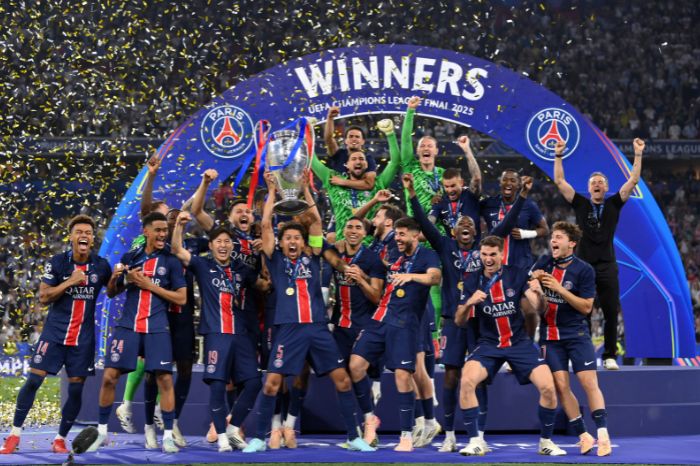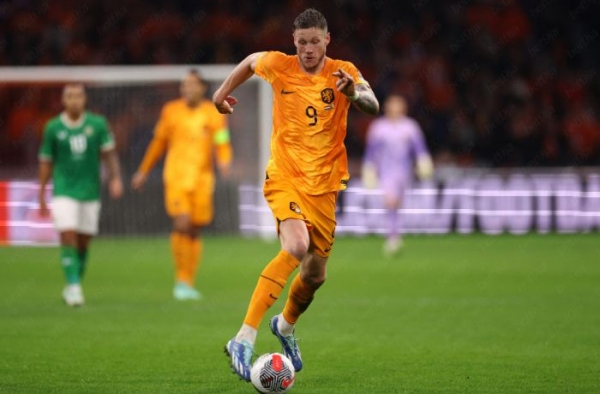Follow @Mike_ThePundit on X for more expert analysis.
In the 70th edition of the European Cup, Paris Saint-Germain finally wrote their name into history, not as hopefuls or nearly-men, but as champions. On a warm night in Munich, in front of a disbelieving crowd, PSG dismantled Inter Milan with ruthless precision. The result, 5-0, wasn’t just emphatic, it was historic. No Champions League final had ever been this one-sided.
With that, the long-awaited weight was lifted. Paris Saint-Germain had not only won their first UEFA Champions League title, but they had done it in grand style, completing a treble that included Ligue 1 and the Coupe de France. Years of hurt were washed away in 90 minutes of unrelenting control and clinical finishing.
New tournament. Same goal ?
— Bet9ja: The home of #betBOOM! ? (@Bet9jaOfficial) May 20, 2025
Bet9ja are proud to be the official sponsor of @NGSuperEagles 2025 AFCON campaign!
Let’s Do It Again, Super Eagles ??? pic.twitter.com/4V91lWcCSN
This wasn’t just about silverware. For a club that had flirted with European success but never quite embraced it, this was redemption. It was a full-circle moment after the heartbreak of 2020, when they lost narrowly to Bayern Munich in their first final, and after countless earlier exits that had fuelled accusations of fragility. The ghosts of the past, the most haunting of which came in 2017, during that now-infamous 6-1 collapse at the Camp Nou, finally felt exorcised.
Under Luis Enrique, PSG have looked nothing like the disjointed, superstar-heavy squads of previous years. They have been organised, purposeful, steered off the path of individual brilliance and for once more than the sum of their glittering parts.
The final against Inter was a dominant Masterclass.
The match itself unfolded as a powerful statement of just how far PSG had come. It wasn’t just a win, it was a transformation crystallised in 90 minutes. From the first whistle, they played with a sharpness and composure that belied the weight of past failures, and within 12 minutes, they had already seized control.
Achraf Hakimi struck the opener early, arriving into the box with perfect timing to finish off a flowing move. It set the tone for what would quickly unravel into the most one-sided final the competition had ever seen. But while Hakimi’s goal opened the gates, it was a teenager, barely old enough to remember some of PSG’s darkest European nights, who truly lit up the occasion.
Désiré Doué, just 19-years-old, played with a confidence that seemed years ahead of his age. He scored twice, both goals taken with the kind of cold-blooded precision reserved for the game’s elite, and also laid on an assist, becoming the youngest player in Champions League Final history to contribute three goal involvements. It was a breakout performance on the grandest stage, the kind that doesn’t just earn headlines, but carves a player’s name into football history.
The dominance didn’t relent. Khvicha Kvaratskhelia, so often PSG’s unpredictable weapon throughout the campaign, got in on the act with a goal of his own,a curling effort that left Inter’s defence rooted and their goalkeeper with no chance. And as if the evening hadn’t already been emphatic enough, it was another teenager, substitute Senny Mayulu, who put the final stamp on the scoreline, adding a fifth late on.
? ????? ??? ????! ?
— Bet9ja: The home of #betBOOM! ? (@Bet9jaOfficial) June 2, 2025
Now you can win up to ?1 BILLION! ?
Even ???? explosive odds! Even ???? chances to win! ?
Are you playing with Victor? ?#CatchTheBOOM pic.twitter.com/KTKlEnx10R
There were no nerves, no signs of hesitation, just a team playing as though this was their moment, and they knew it. PSG, once synonymous with collapse and chaos in Europe, delivered a performance of clinical maturity and unflinching belief.
Enrique’s tactical solidity was evident throughout the season. His emphasis on a high-pressing, possession-based game transformed PSG into a cohesive unit.
For Enrique, it was his second treble, having previously achieved the feat with Barcelona in 2015, placing him alongside Pep Guardiola as the only managers to do so with two different clubs.
With a youthful core and a clear tactical identity, PSG’s challenge now lies in sustaining this level of excellence. The likes of Doué, Pacho, Barcola, Neves and a few others represent a bright future, while Enrique’s contract extension until 2027 ensures continuity.
In a season where they exorcised past demons and redefined their identity, PSG’s ultimate validation is complete. They are no longer the nearly men of Europe, they are its champions.



